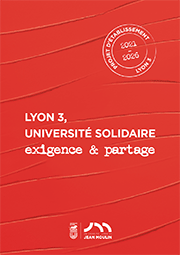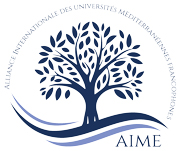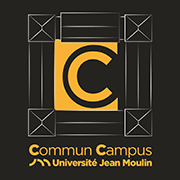AccueilRechercheProgrammes et productions scientifiquesThèsesThèses soutenuesThèses soutenues - 2025
-
Partager cette page
- Recherche,
- Philosophie,
MOUFLIER Camille
Le tout et les parties dans la philosophie de Plotin : méréologies et métaphysiques platoniciennes dans l'Antiquité tardive
Thèse en Philosophie, soutenue le 28/03/2025.
La présente thèse porte sur la méréologie de Plotin, c’est-à-dire sur la relation de tout à partie dans sa philosophie. Bien qu’historiquement cette relation ait d’abord été employée en cosmologie, le fondateur du néoplatonisme élargit son domaine d’application, notamment à l’ensemble de l’intelligible. Il distingue deux types de partie : l’un propre au corps et l’autre à l’intelligible. Or, ce dernier type de partie enfreint ouvertement la relation de tout à partie par l'identité de cette dernière au tout. Comment comprendre alors cette partie ? Nous soutenons que Plotin l’introduit pour rendre compte de la manière dont l'homme participe au monde intelligible et peut s’y identifier. Le premier chapitre resitue le cadre platonicien dans lequel s’inscrivent ces questions méréologiques. Il s’attache principalement à la manière dont Platon a formulé la question centrale de la méréologie dans le Théétète : le tout n’est-il que la somme de ses parties ? De plus, ce chapitre traite des différents types de partie déjà distingués par Platon, notamment dans le cas de l’âme. Il présente enfin le chapitre 2 du traité IV, 3 [27] où Plotin distingue les différents types de partie mentionnés précédemment. Une fois le cadre de notre étude précisé, notre deuxième chapitre porte sur la physique et la cosmologie plotinienne. Celui-ci nous permet d’étudier la partie spécifique au corps par opposition à la notion de qualité. Nous établissons alors que cette opposition correspond plus généralement à celle entre quantité et intelligible. Nous terminons ce chapitre en montrant que le rapport de tout à partie dans le monde ne se limite pas à sa dimension quantitative. Contrairement au monde lui-même, ses parties sont définies par leur impossibilité de combler un manque constitutif : elles ne sont pas autarciques. Notre troisième chapitre vise à comprendre plus spécifiquement la partie intelligible par opposition à la partie quantitative. Nous montrons alors que Plotin l’emploie pour l’ensemble du monde intelligible et plus spécifiquement pour désigner le rapport de l’homme à ce monde. De surcroît, cette dimension holistique est définie par l’autarcie, c’est-à-dire par une absence de manque, dont l’Un se révèle la condition de possibilité. Enfin, notre dernier chapitre porte sur l’homme : partie quantitative du monde sensible et partie du monde intelligible. L’homme, par son âme particulière, s’associe à un corps et court le risque de s’y assimiler, c’est-à-dire de devenir une partie quantitative du monde. Cependant, en se remémorant la nature intelligible de son âme, un autre monde lui est accessible : le monde intelligible. L’âme peut redevenir totale en supprimant tous ses éléments particuliers. Pour une âme, être totale signifie être parfaitement intelligible et autarcique. De cette manière, toute âme peut retrouver la nature intelligible partagée par tous les hommes. Plotin s’inscrit ainsi pleinement dans l’anthropologie antique définissant l’homme par sa rationalité.
Mots-clés : Plotin ; Méréologie ; Partie ; Tout ; Platon ; Métaphysique
This dissertation focuses on Plotinian mereology, i.e. the relation of whole to part in his philosophy. Although historically this relation was first employed in cosmology, the founder of Neoplatonism broadened its field of application, notably to the whole of the intelligible. He distinguishes two types of part: one specific to the body, the other to the intelligible. However, this latter type of part openly contradicts the relationship between the whole and the part due to its identity with the whole. How, then, should we understand this part? We argue that Plotinus introduces it to account for the way in which man participates in the intelligible world and can identify with it. The first chapter repositions the Platonic framework within which these mereological questions arise. It focuses on how Plato formulated the central question of mereology in the Theaetetus: is the whole merely the sum of its parts? The chapter also discusses the different types of part already distinguished by Plato, notably in the case of the soul. Finally, it presents Chapter 2 of Treatise IV, 3 [27], where Plotinus distinguishes the different types of part mentioned above. Having set the framework for our study, our second chapter focuses on Plotinian physics and cosmology. This enables us to study the bodily part as opposed to the notion of quality. This opposition corresponds more generally to that between quantity and intelligible. We conclude this chapter by showing that the relationship of whole to part in the world is not limited to its quantitative dimension. Unlike the world itself, its parts are defined by their impossibility of filling a constitutive lack: they are not autarkic. Our third chapter aims to understand more specifically the intelligible part as opposed to the quantitative part. We show that Plotinus uses this term to refer to the intelligible world as a whole, and more specifically to man's relationship with it. Moreover, this holistic dimension is defined by autarky, i.e., by the absence of any lack, of which the One is the condition of possibility. Our final chapter focuses on man: a quantitative part of the sensible world and a part of the intelligible world. Man, through his particular soul, associates himself with a body and runs the risk of becoming assimilated to it, i.e. of becoming a quantitative part of the world. However, by recalling the intelligible nature of his soul, another world becomes accessible to him: the intelligible world. The soul can become whole again by eliminating all its particular elements. For a soul, totality means being perfectly intelligible and self-sufficient. In this way, every soul can rediscover the intelligible nature shared by all men. Plotinus is thus fully in line with ancient anthropology, which defined man by his rationality.
Keywords: Plotinus; Mereology; Part; Whole; Plato; Metaphysics
Direction de thèse : M. PRADEAU Jean François
Membres du jury :
- M. Jean-François PRADEAU, Professeur des universités, Université Jean Moulin Lyon 3, France, Directeur de thèse,
- Mme Alexandra MICHALEWSKI, Directrice de recherche, CNRS, Sorbonne Université, Paris, France, Rapporteure,
- M. Angelo GIAVATTO, Professeur des universités, Nantes Université, France, Rapporteur,
- M. Laurent LAVAUD, Professeur des universités, ENS de Lyon, France, Examinateur,
- M. Riccardo CHIARADONNA, Professeur, Université de Rome III, Italie, Examinateur,
- Mme Cristina D'ANCONA, Professeure des universités, Université de Pise, Italie, Examinatrice.
Présidence du jury : M. LAVAUD Laurent







